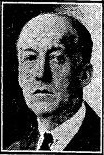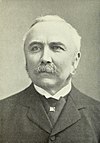Banffshire was a constituency of the House of Commons of Great Britain from 1708 to 1800, and of the House of Commons of the Parliament of the United Kingdom from 1801 to 1983. It elected one Member of Parliament (MP), using the first-past-the-post voting system.
Elgin Burghs was a district of burghs constituency of the House of Commons of Great Britain from 1708 to 1801 and of the House of Commons of the United Kingdom from 1801 to 1918. Until 1832, when Peterhead was added, the constituency comprised the parliamentary burghs of Elgin, Cullen, Banff, Inverurie and Kintore, lying in Elginshire, Banffshire and Aberdeenshire.
Edinburgh was a burgh constituency of the House of Commons of the Parliament of Great Britain from 1708 to 1801 and of the Parliament of the United Kingdom from 1801 until 1885.
Sutherland was a Scottish constituency of the House of Commons of the Parliament of Great Britain from 1708 to 1801 and of the Parliament of the United Kingdom from 1801 to 1918.
Edinburghshire was a Scottish county constituency of the House of Commons of the Parliament of Great Britain from 1708 to 1801 and of the Parliament of the United Kingdom from 1801 to 1918.
Dumfries Burghs was a district of burghs constituency of the House of Commons of Great Britain from 1708 to 1801 and of the House of Commons of the Parliament of the United Kingdom from 1801 until 1918. It elected one Member of Parliament (MP).
Montrose Burghs was a district of burghs constituency represented in the House of Commons of the Parliament of the United Kingdom from 1832 until 1950.
Haddington Burghs was a Scottish district of burghs constituency of the House of Commons of Great Britain from 1708 to 1801 and of the House of Commons of the United Kingdom from 1801 until 1885. It elected one Member of Parliament (MP) using the first-past-the-post voting system.
Forfarshire was a Scottish county constituency represented in the House of Commons of Great Britain from 1708 until 1800, and then in the House of Commons of the United Kingdom until 1950.
Inverness Burghs was a district of burghs constituency of the House of Commons of the Parliament of Great Britain from 1708 to 1801 and of the Parliament of the United Kingdom from 1801 to 1918. It elected one Member of Parliament (MP).
Hawick Burghs was a district of burghs constituency of the House of Commons of the Parliament of the United Kingdom from 1868 until 1918. It consisted of the Roxburghshire burgh of Hawick and the Selkirkshire burghs of Galashiels and Selkirk.
Kilmarnock Burghs was a district of burghs constituency of the House of Commons of the Parliament of the United Kingdom from 1832 to 1918. It elected one Member of Parliament (MP) by the first-past-the-post voting system.
Dunbartonshire was a county constituency of the House of Commons of Great Britain from 1708 to 1801 and of the House of Commons of the Parliament of the United Kingdom from 1801 to 1950.
Caithness was a county constituency of the House of Commons of the Parliament of Great Britain from 1708 to 1801 and of the Parliament of the United Kingdom from 1801 to 1918.
Haddingtonshire was a Scottish county constituency represented in the House of Commons of Great Britain and the House of Commons of the United Kingdom from 1708 to 1918.
Falkirk Burghs was a district of burghs constituency of the House of Commons of the Parliament of the United Kingdom from 1832 to 1918. The constituency comprised the burghs of Falkirk, Airdrie, Hamilton, Lanark and Linlithgow, lying in Stirlingshire, Lanarkshire and Linlithgowshire.
Wick Burghs, sometimes known as Northern Burghs, was a constituency of the House of Commons of the Parliament of the United Kingdom from 1832 to 1918. It elected one Member of Parliament (MP) by the first past the post voting system.
Stirlingshire was a Scottish county constituency of the House of Commons of the Parliament of Great Britain and later of the Parliament of the United Kingdom from 1708 until 1918. It elected one Member of Parliament (MP) by the first past the post voting system.
Ayr Burghs was a district of burghs constituency of the House of Commons of the Parliament of Great Britain from 1708 to 1800 and of the House of Commons of the Parliament of the United Kingdom from 1801 to 1950. It elected one Member of Parliament (MP), using the first-past-the-post voting system.
Kirkcaldy Burghs was a burgh constituency of the House of Commons of the Parliament of the United Kingdom (Westminster) from 1832 to 1974. It elected one Member of Parliament (MP) by the first-past-the-post voting system. From 1832 to 1950 it was, officially, a district of burghs constituency.



